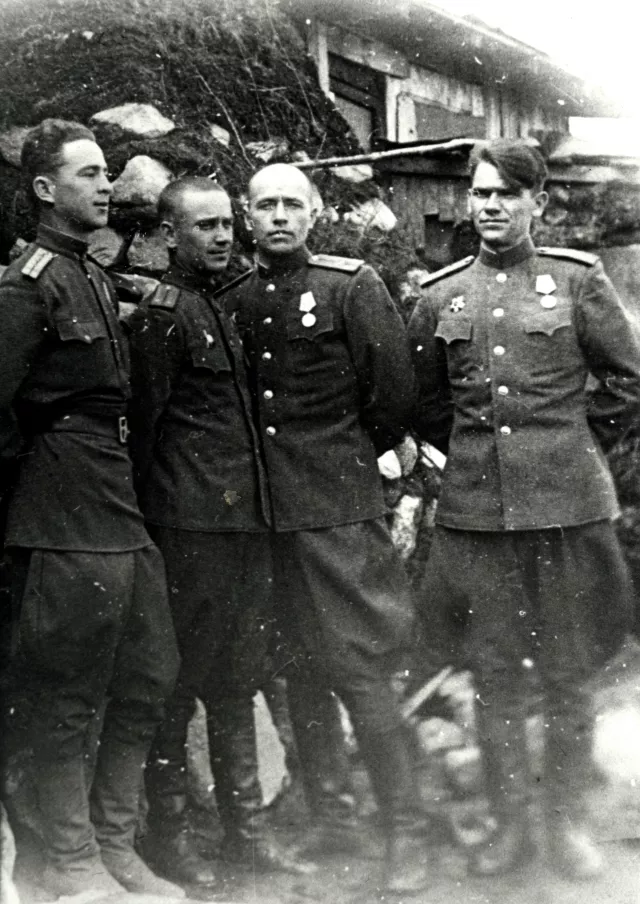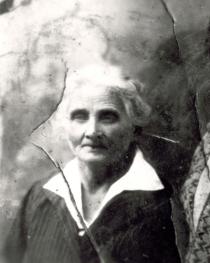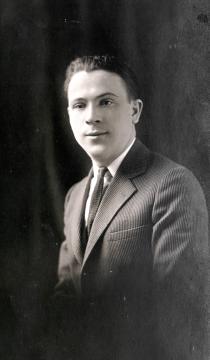This photo, taken in Petsamo in 1944 on October Revolution Day, shows me (on the left), with my comrades, incfluding Sasha Korobko, Assistant Chief of Headquarters of the Regiment (right).
On the very first day of the war, my fellow-students and I went to the military registration office to volunteer to go to the front immediately. But we were medical students, so we had to continue our studies. We finished our second year of studies at the Institute. In August 1941 our Institute evacuated. The teachers went by train and the students went to Kharkov on foot. It was fun at first. The weather was nice and the road was smooth for the first 30 km. But then it became much more difficult. We covered 500 km in about a month. Our classes began on 1st September. We received a very small stipend that was not enough for our living expenses. Some other students and I went to work as nurses at the hospital. Two weeks later evacuation from Kharkov began.
Our Institute was evacuated to Cheliabinsk. I didn't want to go that far away from where my parents were supposed to be. I went to Novosibirsk and was admitted to the 3rd year of Novosibirsk Medical Institute. I had to earn my living and got a job as a nurse at the radio factory. I went to classes in the morning and stayed overnight at the factory. After I finished my 3rd year in Novosibirsk a representative of the Military Faculty of Moscow Institute #2, located in Omsk came to enroll students for the 4th year. I submitted my application and went to Omsk in August 1942. This Military Faculty was very different from an ordinary faculty. We lived in the barracks, wore military uniforms and had to march everywhere. In May 1943 the Institute was reevacuated to Moscow. At the end of 1943 we passed our state exams and became professional doctors. We were also promoted to the rank of captains of medical services.
In January 1944 I was sent to the Karelian front. I became commander of the sanitary unit for the infantry regiment. I got a baptism of fire in February. I volunteered to go to the rear of the enemy as a doctor with a battalion. The chief of headquarters who heard of my desire to go to the rear of the enemy asked with a hint of irony, 'Captain, can you ski? Can you shoot an automatic gun, hold the all-round defense and camouflage? So, what are you butting into, you newly born doctor?' He noticed that I was hurt by his comments and advised me to be careful and to follow what the others were doing. I didn't realize then that the chief of headquarters was worrying about me and wanted to save my life. Later I became a doctor for the medical and sanitary battalion and senior doctor of the regiment, but I always remembered the wise chief of headquarters and my dangerous campaign into the rear of the enemy.
In November 1944 we left Norway to deploy in the vicinity of the town of Petsamo, in the tundra. I faced anti-Semitism for the first time there. Once we were sitting in the company of doctors. There were women doctors there, as well as the director of the hospital and the visiting chief of headquarters of the regiment. We were talking with him and he said to me, 'You are a good guy, even though you are a Jew'. I froze, but kept silent. The chief of headquarters was senior in rank and if I had decided to sort things out with him it might have cost me several years in prison camps. At dawn on 9th May 1945 I woke up to the sound of people shouting, 'Get up all! Victory!'. People all around were saluting and shooting their guns.
Moisey Goihberg with his comrades on the front
The Centropa Collection at USHMM
The Centropa archive has been acquired by the United States Holocaust Memorial Museum in Washington, DC.
USHMM will soon offer a Special Collections page for Centropa.
Academics please note: USHMM can provide you with original language word-for-word transcripts and high resolution photographs. All publications should be credited: "From the Centropa Collection at the United States Memorial Museum in Washington, DC". Please contact collection [at] centropa.org.

















